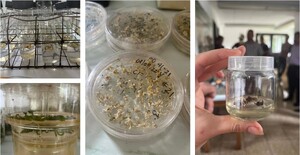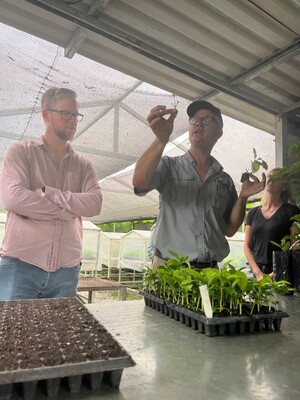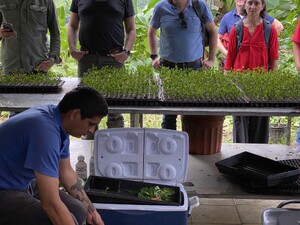
Coffee Breeding Network for Long-term Coffee Supplies
Agricultural science is essential for securing the global supply of high-quality coffee in the face of the climate crisis. That's why Tchibo is a member of World Coffee Research (WCR). World Coffee Research is a nonprofit agricultural research organization comprised of more than 200 coffee companies from 30 countries that work together to find innovative solutions for sustainable coffee cultivation.
Today, World Coffee Research announced in Jaco, Costa Rica the formation of the Innovea Global Coffee Breeding Network. Innovea brings together collaborating countries to transform global coffee breeding and accelerate the pace of genetic improvement.
Tchibo is not only a member of World Coffee Research, but we are also represented in its leadership by board member by Pablo von Waldenfels, Tchibo Director of Corporate Responsibility. I spoke with Pablo von Waldenfels and Hanna Neuschwander, Director of Strategy and Communications for World Coffee Research about super plants, seeds, breeding programs, genetic engineering—and the future of coffee.

Pablo, why is it important for Tchibo to actively support World Coffee Research (WCR)?
Pablo von Waldenfels One important piece of the puzzle is to develop coffee varieties that adapt to changing weather patterns, due to climate change. Apart from World Coffee Research, there's no organization that actually can do it, and that's why we said OK, we need to engage together with other companies. We are super convinced that this is the right thing to do.
Hanna, what is your organization about? Are you biologists and scientists? You study coffee plans down to the smallest DNA?
Hanna Neuschwander We're a very practical research organization. We're not focused on scientific questions like a university might focus on. We're very product-oriented. It's all about getting new plants and better plants into the hands of farmers. Our work begins where the coffee supply chain starts, which is with the plant and the seed. We are a fairly small but global organization that focuses on developing new varieties and making them available and accessible for farmers in key geographies around the world. This new collaborative global breeding program is launching today! And it brings together nine participating countries to pool our efforts to increase the speed and the improvement of coffee plants available to farmers.

Why is it so important for us to stay scientifically up-to-date, Pablo? We are not farmers. We are a roaster
Pablo von Waldenfels The future of our company depends on it. If we want to secure a long-term supply of good quality coffee at reasonable prices and quantities, we need the support of science to help us develop the varieties of the future.
Hanna Neuschwander If you think about any of the foods that we eat, fresh vegetables or fruits that you buy in the grocery store, all of those are the product of breeding. They're all the product of scientific engagement in our food system—and coffee is just very far behind other food crops. What we're trying to do is sort of bring some of what modern science has allowed other crops to do into coffee.
Which challenges will the coffee world be facing in the short, mid, and long term? How are you going to respond to these challenges with traders like Tchibo?
Hanna Neuschwander The weather, diseases, and the market price. Those are the three challenges. It doesn't matter what you're growing. Every farmer has to deal with those challenges. I think the severe crisis that farmers are facing also in the short term is climate change. Farmers have a lot of risk that they carry. So through the development of new and better plants, we are able to offer farmers tools that help them adapt to this changing reality. You know, once you get over 32 degrees centigrade, you can't succeed as a farmer. But if you have a plant that's heat tolerant, or if you have a plant that's tolerant to a disease that has moved into your area that didn't exist in that area before, then you have a shot at continuing to be able to earn your livelihood from farming. They need more options that are tailored to work for the challenges that they're facing. What we do is create more varieties, more tools for farmers to be able to meet their challenges.
So, you're looking for the super plant?
Hanna Neuschwander There's no silver bullet. There's not a single plant that is going to help all farmers. Farmers need options. They need many options. So, it's about having a diversity of different varieties that have different traits that are useful for farmers and different situations. A farmer in Uganda is not dealing with the same challenges as a farmer in Guatemala, so they need different options.
You're talking about many varieties. There is more than Arabica and Robusta?
Hanna Neuschwander Yes, those are species. There are really about 130 species of coffee that are known in the coffee family—we drink two of them, we commercially farm two of them, Arabica and Robusta. Within those species, there's a lot of variation. At the level of within-species, you can breed or select for different traits.
Does genetic engineering play a role in coffee cultivation?
Hanna Neuschwander There isn’t a lot of interest from consumers in genetically engineered coffee. It's the reason we have a policy against developing genetically modified coffee in any way. We live in the Golden Age of genetics, and we can learn a lot about coffee. We can do a lot with our knowledge of coffee genetics to help us be more efficient in creating new varieties without actually employing genetic modification.
Do we have a coffee future in 50 years?
Hanna Neuschwander I think we do, yes. The beauty of science is that it's very optimistic. It's all about addressing challenges and creating new opportunities and new choices. If we don't engage, if we don't do this work now, then the answer is no. But we're doing it and companies like Tchibo are stepping forward in a really significant way to make that possible.


